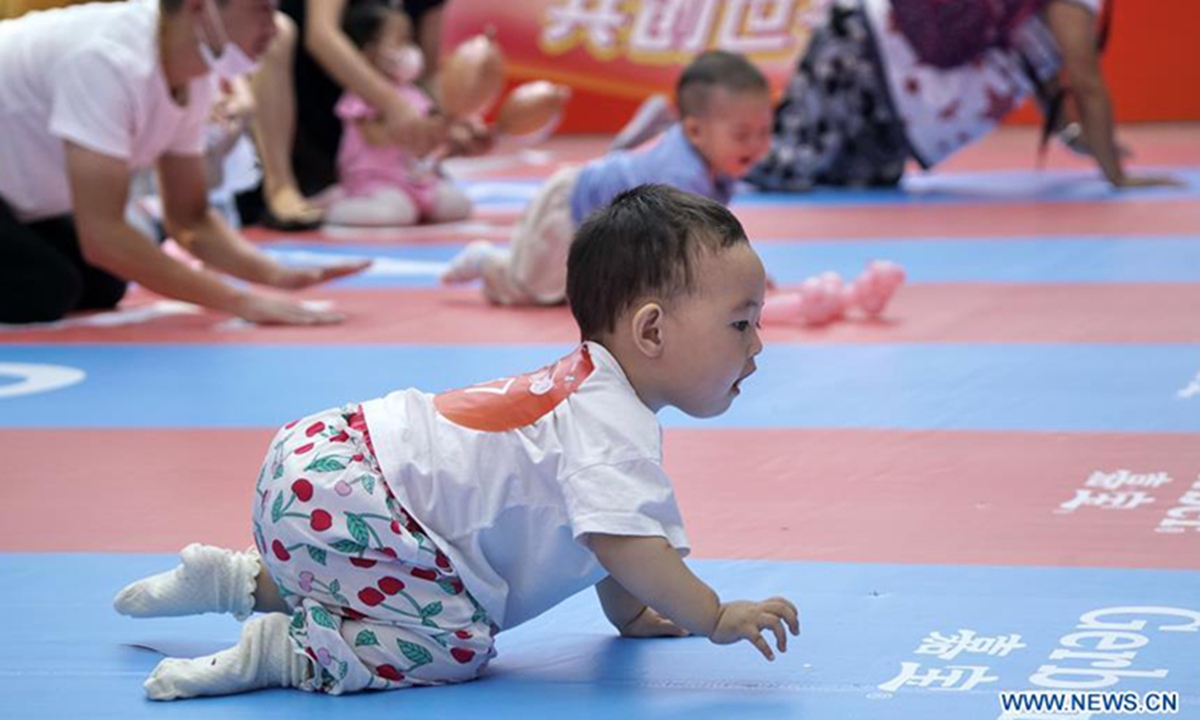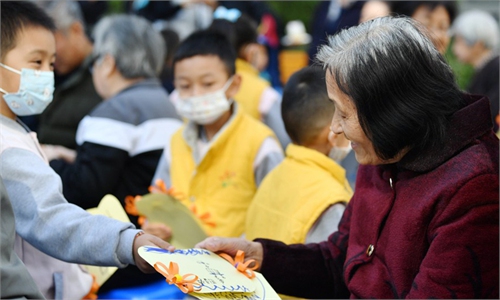
Babies participate in a baby crawling contest at a shopping center in Daxing District, Beijing, capital of China, Sept. 13, 2020. Photo:Xinhua
The Health Commission of Sichuan Province announced on Monday that it will end restrictions on marital status and the number of births used for the registration of newborns starting February 15, further simplifying the registration process.
Officials said the move is intended to shift the focus of the birth registration work to encourage fertility willingness, which is in accordance with the country's original aim to monitor population and to provide fertility services.
The new regulation has removed restrictions on whether people have to get married before they can register the births of their children and the number of children they can have, stipulating that all citizens who have children should register their births.
The process and requirements for birth registrations have also been simplified so that the birth registration system will be linked to other citizen identity information systems, and citizens' identification documents will no longer have to be updated each time.
The Health Commission of Sichuan Province said that the new regulations aim to improve the birth registration system and further implement the National Health Commission's (NHC) request to improve and strengthen birth registration services.
The move, coming after the population in the Chinese mainland fell for the first time in 61 years in 2022, triggered heated discussion on social media.
Some people said that the policies would bring convenience to single women who do not want to get married but do want children, while others doubted how much it would stimulate people's willingness to have children, saying that the biggest problem preventing Chinese young people from having babies is the high cost of raising children rather than the policies.
Amid heated discussion, the Sichuan health authority told the media that the move is not aiming to encourage single people to have children before getting married, but to ensure that single people and their children can enjoy the same fertility service, even if they are not married.
The authority also clarified that birth registration is not the same as household registration, and the policy has been launched in several other places in China. Birth registration is mainly aimed to grant people with deserved rights and obligations.
Rather than saying whether Sichuan's initiative will fundamentally reverse China's demographic trends featuring a low fertility rate and a fast-aging population, it is more likely that the Chinese society is moving toward a more inclusive population policy, Liu Hongyan, deputy director-general of China Population and Development Research Center, told the Global Times on Monday.
Liu explained that the decline in the number of births in China is directly related to the decline in the number of women of childbearing age, a problem that is difficult to alleviate with policies.
The main purpose of removing restrictions on marital status from birth registration is to better protect the health and reproductive rights of the people, especially those who have children without getting married, Liu added.
Prior to Sichuan, other provinces have enacted similar measures or publicly solicited comments on similar policy adjustments.
In May 2022, South China's Guangdong Province improved its birth registration system, emphasizing the neutrality and objectivity of birth registration as a working tool for population monitoring only. In Guangdong's regulations, people who are unmarried and have children can register new births. In June, the health commission of Northwest China's Shaanxi Province clarified in its regulations on birth registration, saying that births out of wedlock can be registered. Central China's Anhui Province publicly sought public comment on a similar policy in August.
The new birth registration measures in these provinces are seen as implementing the central government's request to improve the birth registration system in 2021.
The population in the Chinese mainland fell for the first time in 61 years, decreasing by 850,000 in 2022, data released by the National Bureau of Statistics of China (NBS) showed.
Experts who track China's long-term population trends said that the decline is the inevitable result of the country's long-term fertility rate plus its impressive social and economic development.
"China's population peaked in 2022, much earlier than expected, which means that the population may fall further in 2023," said Cai Fang, former deputy director of the Chinese Academy of Social Sciences.
China announced a third-child policy in May 2021 and rolled out a series of stimulus measures to boost population growth. A number of provinces and regions across the country have rolled out incentive policies such as issuing subsidies to families with a second or third child.



